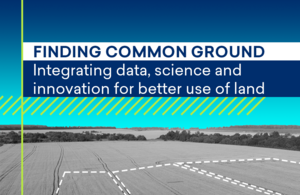Geospatial Commission recommends creation of new taskforce for land use
New report sets out how integrating data, science and innovation can help make better use of UK land.

- New Geospatial Commission report recommends establishment of new Land Use Analysis Taskforce
- Taskforce would bring together cutting edge data and scientific expertise to support land use decision making
- New report sets out how integrating data, science and innovation can help make better use of UK land
A new Land Use Analysis Taskforce should be established to support decisions about how land in the UK is used, according to a new report from the Geospatial Commission
The report, published today (Tuesday 23 May), recommends that government policies related to using land should be supported by a new taskforce and cutting edge data analysis.
The new taskforce would assess the potential to reconcile competing demands for how we use our land to meet national priorities - such as those relating to infrastructure, housing, agriculture and the environment - with the land available in the UK.
Better use of land is a key driver of the UK’s ambitions to deliver economic growth and fairly distribute opportunity across every part of the UK, while meeting the demands of a growing population. The report sets out how better data can be used to drive land-use decisions that drive growth, while also protecting the environment, adapting to climate change and achieving net zero emissions.
Viscount Camrose, Minister for AI and Intellectual Property at the Department for Science, Innovation and Technology, said:
Land is fundamental for how we live our lives - it produces the food we eat, supports ecosystems that we rely on for clean air and fresh water, and provides the space for us all to live and work in. As we face new economic and environmental pressures, we need to make smart choices to get the best from our land.
We should capitalise on advances in data science and modelling technologies to help us bring together data from a range of sources, and present it accessibly, in order to support better use of land.
Recognising land use pressure as a cross-cutting national challenge, the Geospatial Commission initiated the National Land Data Programme (NLDP) which has explored key land use challenges and demonstrated where innovative data analysis and evidence can support better land use decisions. The new report sets out recommendations for how the UK’s data capabilities can be enhanced to support land use decision making, with a more integrated understanding of urban and rural needs.
The report has four recommendations:
- Establish a Land Use Analysis Taskforce to bring together cutting edge data and scientific expertise to assess competing land use pressures, ensuring national priorities are delivered within the land available in the UK
- Champion market innovations that help visualise and deliver how we can achieve better land use decisions
- Strengthen the links between land use policy design, academic research and industry practice
- Develop a standard approach to classifying key land use data to improve how we can link data about land
The report highlights that land use is fundamentally a spatial challenge. Some land cannot be used for multiple purposes. However, there are significant opportunities for multifunctional land use (such as rooftop solar energy). The report considers these opportunities across six sectors: energy, housing, biodiversity, food, water and transport.
The recommendations are based on evidence from academic and industry experts and findings from NLDP’s regional pilots in Devon, Cambridgeshire, Newcastle and Northern Ireland. The pilots explored how data analysis and modelling could support local decision making in a range of ways, including through prototype decision support tools, using AI techniques to test local land use change scenarios, and combining disparate datasets to generate new insight.
For more information about the programme and to get in touch, contact us at [email protected].